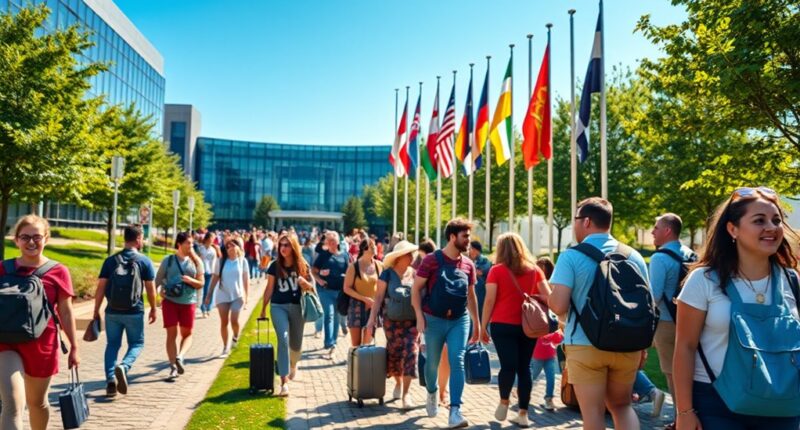Global student mobility is booming, with more students crossing borders for study and cultural exchange. You’ll notice a rise in study abroad and exchange programs driven by your peers’ desire for new experiences, career boosts, and personal growth. As countries become more interconnected, adapting to different cultures and languages is key. Supporting your journey with good sleep habits and intercultural skills can make your experience smoother. Keep exploring to discover how these trends can shape your international education adventure.
Key Takeaways
- Increasing student participation in international study abroad and exchange programs reflects growing global interconnectedness.
- Cultural adaptation challenges emphasize the need for support systems, intercultural competence, and language acquisition.
- Developing good sleep hygiene and health habits aids students’ stress management and overall success abroad.
- Immersive language learning enhances communication skills, confidence, and meaningful community engagement.
- Trends show a shift towards holistic personal development through cross-border education, beyond just academic pursuits.

Have you ever wondered how students around the world are crossing borders more than ever before? It’s a trend driven by the desire to gain new experiences, improve career prospects, and immerse themselves in different cultures. When you decide to study abroad or participate in an exchange program, you’re about to set out on a journey that goes far beyond academics. One of the most significant challenges you’ll face is cultural adaptation. Moving into a new environment means adjusting to unfamiliar social norms, traditions, and everyday routines. This process requires openness, flexibility, and resilience as you learn to navigate differences in communication styles, social etiquette, and even daily habits. Successfully adapting to a new culture enhances your personal growth and broadens your worldview, making your experience richer and more meaningful. Developing sleep hygiene habits, for example, can help you better handle the stresses of cultural transition and jet lag.
Alongside cultural adaptation, language acquisition plays a vital role in your international education journey. When you step into a new country, you often need to communicate in a language that might be quite different from your native tongue. This can initially feel intimidating, but it’s also incredibly rewarding. As you immerse yourself in the local environment—whether through classes, social interactions, or daily activities—you naturally pick up new vocabulary, pronunciation, and idiomatic expressions. The more you practice, the more confident you become in your language skills. Gaining proficiency in a foreign language not only helps you succeed academically but also opens doors to meaningful connections with local students and communities. It transforms your experience from simply attending classes abroad to truly engaging with your surroundings.
Studying abroad fosters a unique environment where cultural adaptation and language acquisition go hand in hand. You learn to see the world from different perspectives, which enhances your intercultural competence. This skill is increasingly valuable in today’s interconnected global landscape, where understanding diverse viewpoints can boost your career and personal relationships. Many programs offer orientation sessions, language immersion activities, and support networks to help you settle in and overcome initial hurdles. Embracing these opportunities accelerates your adaptation process and enriches your experience. Overall, crossing borders through study abroad isn’t just about earning a degree; it’s about transforming yourself into a more adaptable, culturally aware individual capable of thriving in diverse environments.
Frequently Asked Questions
How Do Visa Policies Impact International Student Mobility?
Visa regulations considerably impact your ability to study abroad. Strict or complicated student visa processes can delay or discourage your plans, making it harder to access international education opportunities. Conversely, streamlined visa policies and clear requirements for student visas make it easier for you to apply and gain entry. When countries simplify their visa procedures, you’re more likely to pursue your studies abroad, enhancing global student mobility.
What Are the Top Destinations for International Students?
You’ll find the top destinations for international students include the United States, United Kingdom, Canada, Australia, and Germany. These countries attract students through rich cultural exchange opportunities and strong programs for language acquisition. As an international student, you’ll benefit from diverse cultural experiences and improve your language skills, making your study abroad journey valuable both academically and personally. These destinations continue to lead in global student mobility due to their welcoming environments and educational excellence.
How Has Online Learning Affected Study Abroad Programs?
Online learning has transformed study abroad programs into a digital landscape, like a bridge connecting worlds. You can now experience virtual classrooms and digital immersion, making education more accessible than ever. While it’s not a perfect substitute for physical travel, it broadens opportunities, allowing you to learn from anywhere. This shift encourages flexibility, but also challenges the cultural and social aspects that come with traditional study abroad experiences.
What Financial Aid Options Are Available for International Students?
You can explore scholarship opportunities, which can substantially reduce your study abroad expenses. Additionally, many universities offer grants, fellowships, and work-study programs tailored for international students. To make the most of your financial planning, consider applying early and researching external funding sources like government aid or private organizations. Budget wisely, and don’t hesitate to reach out to your prospective institution’s financial aid office for personalized assistance.
How Do Geopolitical Events Influence Student Exchange Trends?
Geopolitical tensions and strained diplomatic relations often decrease student exchange programs, as countries become cautious about safety and visa policies. You might notice fewer opportunities or delays in processing applications during such times. Conversely, improved diplomatic ties can boost exchange trends, making it easier for international students to study abroad. Staying informed about current geopolitical events helps you plan better and adapt to changing circumstances in global student mobility.
Conclusion
As you navigate the world of global student mobility, remember it’s a bridge connecting dreams and realities, stretching across borders like an unbreakable thread. The trends reveal opportunities for growth and cultural exchange, but also remind you that adaptability is your strongest compass. Embrace these shifts with open arms, for every exchange is a new chapter waiting to be written. In this evolving landscape, your journey becomes a beacon, illuminating pathways for others to follow.










